#tips to write humor
Text
Types of Comic Relief Characters
We all love a good funny character, but some of us just have no sense of humor and no idea how to create such a jokester! With that being said, today, I'll show you that writing a comic relief character doesn't always require hilarious quips and jokes! So, here are several different types of humorous character archetypes that you can include in your writing pieces! Just a heads up, I created the names for these types of characters, if they have a different one on the internet, I apologize! (I only did this because I couldn't find any real references on the internet.)
The Commentator - This character is just there to comment random things during situations to brighten up the atmosphere. Usually, they're really just a minor character who lacks depth because their only purpose is to make mirthful and entertaining remarks.
The Annoying One - This character loves annoying and frustrating people however they can. They tend to not take anything seriously, and in the eyes of characters, they are bothersome and irritating. But to the audience, on the contrary, they should seem endearing and witty! It's their personality that makes it so interesting to read and write about them, especially when you add more complexity to their persona! (Which is highly suggested, by the way.) Lastly, when creating this character, it's important to remember that part of the humor is derived from their words and actions, while the other part comes from the responses and reactions based on how other people react towards their antics.
The Happy-Go-Lucky Character - This character doesn't actually have to be super funny, as their main purpose is to relieve tension with their positivity! The Happy-go-lucky character is designed to appeal to the audience by appearing cute and wholesome with their upbeat energy. This way, they're typically a fan favorite! Additionally, they're often a pretty major character, so I suggest giving them some dimension! Again, they're not produced to be the most humorous type, but they're a great fit for any comical situation!
The Stupidly Smart One - Exactly like what the name states, this character is just stupidly smart. Typically, they're very impressive academically, but they lack logic and rationale. They also hardly use their abilities to their fullest potential because they have an abundance of motivation. They're often an incredible asset during any major event, but other than that, they're just there for the party!
The Hard-to-Read Character - This character archetype does not have a strictly set personality. In other words, it should be challenging to describe them with one adjective! They have a blend of several different personality traits that sometimes may seem contradictory, but it really just depends on the situation they're in! The main thing about them is that at times, it's difficult to tell whether they're joking or serious. For example, maybe they state something serious, but their expression displays otherwise. Writing this style of character will require a lot of effort and creativity, but I find that this archetype is very rare in novels so it's definitely worth a shot!
The Chaotic One (Duo) - This is an amazing archetype if you want your audience to have some laughs! I personally think it's much more fun to read (and write) about a chaotic duo, instead of just one character. This way, you can create hilarious conversations and interactions between the two! This character type lives almost solely to troll and isn't very reliable with things that don't matter to them. However, if you're writing a fantasy story, note that there is nothing wrong with giving them some overpowered abilities, as it shows more of their dimension and potential! If you're creating the duo, make sure that the characters causing the mayhem each have a separate personality. Typically, there is a 'ringleader,' who leads the shenanigans and is the most chaotic of them all. Additionally, there's usually a semi-serious character, whose job is to keep them in line. Nevertheless, they still join in the antics and reckless actions! Interactions between the two are mostly meant to be humorous, wholesome, and fluffy, so just have fun and let loose when writing this archetype!
Okay! These are six different types of comic relief characters you can use for your stories! Hopefully, this is able to serve as inspiration and/or a guide for you all! If you need any tips on bringing these archetypes to life, just ask, and I'll try my best to provide the quality information you all deserve!
Happy writing~
3hks :D
#writing#writeblr#writerscommunity#writing tips#writing advice#writing inspo#creative writing#funny characters#different types of funny characters#tips to write humor
80 notes
·
View notes
Text

#writing#writers#writers on tumblr#writing community#writer things#writerslife#writerscommunity#novel writing#writers and readers#writing tips#writing memes#writing problems#writer problems#writing humor#writer stuff#writer memes
9K notes
·
View notes
Text
How To Overcome Writer's Block/Procrastination: A Guide.
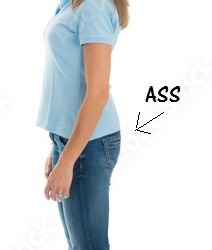



#writblr#writers on tumblr#writing community#writers of tumblr#writing#writing advice#writing tips#procrastination#writer#writers#writers problems#writers block#writing meme#writing memes#writing humor#queue
375 notes
·
View notes
Text
Free Therapy for Writers?
Yeah, sometimes I do that and it's pleasing. Definitely a free therapy for many writers.

Tumblr
#writing#writings#writing community#writing prompt#writing prompts#writing tips#writing inspiration#writing inspirations#writing meme#writing memes#writer meme#writer memes#writers meme#writers memes#writers#writer#writers on tumblr#writers community#writer community#writing humor#writing humour#writeblr#writing blog#writer blog#writer blr#meme#memes#humor#humour#write
244 notes
·
View notes
Text
If you’re ever insecure about how often you use commas or how long your sentences are I IMPLORE you to read the Treaty of Paris (1783), specifically article two.
510 words.
2 periods.
FIVE HUNDRED AND TEN WORDS.
A GRAND TOTAL OF TWO SENTENCES!
SIGNED BY DOZENS OF PEOPLE TO SET UP A TREATY AND AUTHORIZE LAND!!
Like don’t worry babes your 3 commas and semi colon are NOTHING to the revolution era and that’s what truly matters.
#american revolution#treaty of paris#treaty of Paris 1783#article two#sentences#writing tips#writing advice#writing community#writing#writing humor#writing memes#semi colon#commas#comma usage#revolutionary war#revolution era#ao3#fanfiction writer#writers of tumblr#writing stuff#writing problems#writing hacks
252 notes
·
View notes
Text
A longread on writing comedy
This is what I do to research writing comedy:
What helped me most was analyzing a lot of jokes: "It's funny. Why is it funny? How does this joke work?" Usually it's something that subverses the expectations in a specific way or an unexpected collision of two things. (Like a pun is a collision of sound and meaning.) For my analysis, I wonder: "What is the expectation after the set-up? Why do I have this expectation? How does the pay-off subverse the expectation? Why does it still make sense in relation to the set-up?"
For example: I unleashed this kind of analysis on the movie George of the Jungle. It has a surprisingly high hit rate, I think around three jokes per minute in the first one third of the movie, and it still manages to get the story going and the characters introduced. I’ve mentioned this before, but I don’t think I gave examples, and you know I’m all about the teaching.
I found at least 17 types. Heads up, this is going to be a longread.
Type 1: Puns
Narrator: “When they finally beheld the mighty Ape Mountain…”
[They see a mountain shaped like a gorilla head.]
Narrator, cont’d: “… they reacted with awe.”
All: “Aww.”
Narrator: “I said ‘awe”. A-W-E.”
All: “Ooh!”
Narrator: “That’s better.”

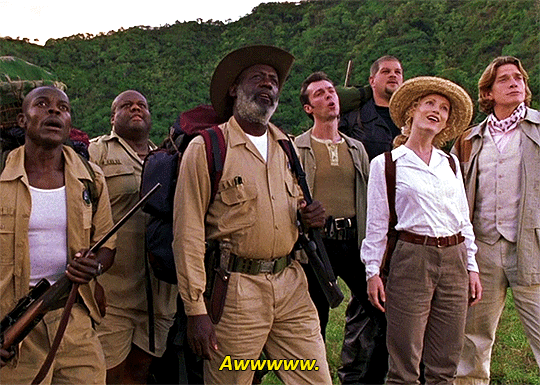
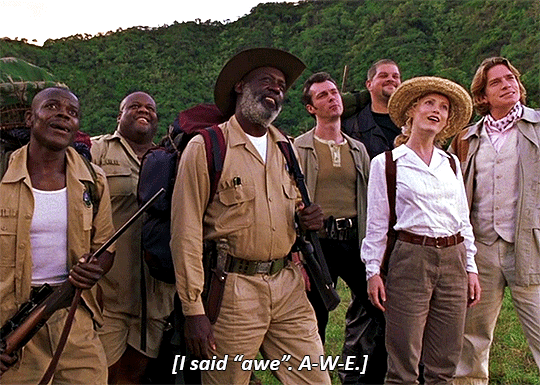
Explanation:
The pun lies in the fact that “awe” and “aww” sound the same.
There is a visual type of comedy as well that we can’t effectively reproduce in writing: the mountain is shaped like a gorilla head.
BTW: the narrator defies genre expectations by interacting with the characters, and the characters defy genre expectations by being able to hear the narrator.
Type 2: Tone of voice
Narrator, about the main characters: “Scraped and boo-booed, they searched high and low.
Explanation:
“Boo-booed” is a children’s word, not the tone you would use for a hero. Compare “tummy” and “stomach”.
Type 3: Defying genre expectations
[The guide falls off a rope bridge into a deep chasm.]
Narrator: “Don’t worry—nobody dies in this story. They just get really big boo-boos.”
Explanation:
The narrator is breaking the fourth wall.
Again: tone of voice with the “boo-boos”.
Contrast between the boo-boo and the injuries one usually suffers after falling into a deep chasm.
Type 4: Not defying genre expectations
[A lion appears from the bushes. A baby monkey makes a sound like “uh-oh”.]
[The baby monkey does the Tarzan call and bangs its chest.]
[The lion flees.]
[The monkey giggles.]
[The monkey gives George a thumbs up.]
[From the bushes, the lion winks at George. George winks back.]
Explanation:
Expectation: the lion is a danger to the baby monkey and George will need to fight it to save the monkey.
Defying expectations: the monkey and the lion are in on the plan.
Not defying genre expectations: George of the Jungle is clearly based on Tarzan. George doesn’t refer to that fact, but the monkey does, by doing the Tarzan call and banging its chest.
Improbable: monkeys who giggle and give thumbs up.
Impossible: lions who wink.
Type 5: Contrast
Narrator: “Meanwhile, 43 vines away, George’s kingdom is being threatened by a terrifying intruder.”
[We see the adorable Leslie Mann, who plays Ursula, smiling and talking to the camera.]
Ursula: “Hi! It’s me again!”
Explanation:
Contrast between what the narrator says and what we see.
The narrator isn’t lying. He refers to Lyle and the poachers who will be introduced in this scene.
There’s also humor in the phrase “43 vines away”, because of the overt specificity and because a vine is not a measure of distance.
Type 6: Oblivious character
[Lyle takes a Polaroid picture of one of the guides.]
Lyle: “Do you like it? Magic picture. Yet another gift from America. Here you go. You’re welcome.”
[The guide replies in Swahili. There is no translation in the subtitles.]
[All the guides laugh.]
[The guide continues in Swahili. Only the last few words are in English: “35 mm.” The guide takes his own camera and snaps a picture of Lyle.]
[All the guides and Ursula laugh.]
Lyle, not amused: “Translation, please.”
Other guide: “He says he likes your magic pictures, but he prefers the resolution of the Leica 35 mm transparencies.”
[Everyone but Lyle laughs.]
Other guide, cont'd: “He also says your lens is dirty, but he has the equipment to clean it for you.”
Explanation:
Lyle doesn’t understand Swahili, while the guides understand everything Lyle says to them in English.
The fact that Ursula, Lyle's fianceé, understands Swahili and laughs along with the guides, is adds contrast to his obliviousness.
Lyle is the butt of the joke. He humiliates the guides and now he’s humiliated on his own turf while the guides don’t stoop down to his level.
This joke is threefold: 1. The set-up: Lyle is the arrogant asshole who thinks he’ll show the locals about technological development. 2. The guide is not only not impressed, he knows Polaroid and has a camera of his own, and is knowledgeable. 3. And he demonstrates his superiority in a (more or less) polite way.
Type 7: Slapstick
[George is swinging on the vines.]
Narrator: “He is swift. He is strong. He is sure. He is smart.”
[George hits a tree and falls.]
Narrator, deadpan: “He is unconscious.”
Explanation:
Slapstick is another type of humor that barely translates to written fiction, when the actors behave silly, for example by falling over, hurting themselves, or others. It's often over the top. Laurel & Hardy is a well-known example of slapstick.
Type 8: Alliteration
Narrator: “The tired trekkers trudged on feverish footsies over perilous paths.”
Explanation:
If several words in each other’s vicinity start with the same letter, it’s called alliteration.
Note that "footsies" is another example of a contrast in tone of voice—it’s another children’s word.
Type 9: Improbable things
[George spins a lion over his head.]
George: “George not even trying hard.”
Explanation:
While not impossible, spinning an actual lion over one’s head is improbable and thus goes against real-world expectations.
Type 10: Impossible things
[A gorilla called Ape enters George’s tree house and scares Ursula.]
Ursula: “What does it want? What does it want?”
Ape: [points at a big book] “It wants its Physician’s Desk Reference, if you don’t mind, unless you’d rather die of dengue fever, of course.”
[Ursula faints again.]
Explanation:
Gorillas can’t talk, can’t read, and aren’t usually well-versed in curing tropical diseases.
Type 11: Breaking social norms
[Ursula is unconscious. George licks her face, clearly meaning well.]
Explanation:
In our society, it is not only considered impolite but also gross to lick the face of a stranger. The fact that George does this anyway, clearly not realizing he does something wrong, is a subversion of what we’d expect of social norms and behavior.
Type 12 and 13: Hyperbole and understatement
[Earlier, Ursula fainted when she saw Ape talk and do human things.]
[Ape is reading when he sees Ursula look at him. He panics, throws the book away, starts grunting, and bangs his chest.]
[Ursula faints again.]
Ape: “Eh.”
Explanation:
Ursula fainting again is a hyperbole: a reaction that is stronger than expected.
Ape saying “Eh.” is an understatement: a reaction less strong than expected.
Type 14: Obvious repetitions
Ursula: “… And I didn’t want my fianc—Um, this guy I was with, to worry.”
Narrator, a few moments later: “George and Ursula set out on a desperate search to find her fianc—Uh, that guy she was with.”
Type 15: Stating the obvious
[We see the guide’s hand, pointing at a really big footprint in the mud.]
Narrator: “Meanwhile, back at the really big footprint in the mud, (...)”
Explanation:
Stating the obvious can be funny because the audience doesn’t expect you to do or say this because it is so very obvious.
Type 16: Adult humor
[George watches Ursula sleep.]
George: “George having stirrings of special feelings right now.”
Ape, drily: “I see.”
George: “Good thing she same species, huh?”
Explanation:
Ape’s reply, “I see”, could be an innuendo, but it doesn’t come across as a joke (to me at least). Maybe it’s downplayed because it’s a children’s movie.
If this is an innuendo, it’s a play on words. “I see”, figuratively, for “I understand”, or literally for “Yes, I can tell from your erection.”
“Good thing she same species” because George shouldn’t have stirrings of special feelings for animals.
Type 17: Rhyme
[George is swinging on a vine.]
George: “Look, like this!”
Song: “He flies through the air with the greatest ease.”
Song, cont’d: “Our daring young man on the flying trapeze.”
[George hangs upside down from a vine.]
George: “Look, no hands.”
Song, cont’d: “His movements so grateful, all girls he could please.”
Song, cont’d: “And with love he is swinging away…”
[On the ground, gorillas frantically run back and forth with a safety net.]
Song, cont’d: “He flies through the air with the greatest of ease.”
Ursula: “George, watch out for that—”
Song, cont’d while George yelps: “Our daring young man on the—” [Song stops abruptly.]
[Thud]
[George grunts.]
Ursula: “… tree.”
Explanation:
When words end in the same sounds, we call it rhyme.
It’s physically impossible to hang from a vine with no hands.
The gorillas with the safety net imply that they expect George to fall.
Also, it’s improbable that gorillas would do this.
Slapstick: George hitting the tree.
Comedic timing: Ursula being just too late to warn George about the tree.
Song + Ursula: “Our daring young man on the—tree.” Because by then he is literally stuck to the tree.
Or throw everything at the audience, whatever.
[George has a pet elephant, Shep, who behaves like a happy doggy.]
[Shep is chewing a humongous bone.]
Narrator: “Later, they rested, while the tired tusker teethed on a… Wait a second, the dog bone is too much. Lose it.”
[The dog bone disappears.]
Narrator: “That’s better.”
[Shep whines.]
Explanation:
Improbable: Pet elephant who behaves like a doggy.
Alliteration: “tired tusker teethed”
Fourth wall: the narrator comments on the story while it is going on, and edits it.
***
Here are some other funny situations from the movie. Try to analyze what’s going on. Usually you can spot several types.
Situation 1
Narrator: “Meanwhile, at a very big and expensive waterfall set, Ursula was amazed that she was lost in the wilderness with a jungle man.”
Ursula: “And here I am, lost in the wilderness with a jungle man.”
Situation 2
Narrator: “The guides came dangerously close—”
Narrator: “That is, dangerously close to shove a coconut up in Kyle’s—”
Narrator: “Sleeping bag.”
Situation 3
Lyle: “I am the richest, handsomest, smartest guy here, so I get to go first!”
[Lyle pushes past everyone, trips over a tree stump and lands face first in a steaming pile of elephant poop.]
Lyle: “There’s an elephant here.”
Guide, while looking straight into the camera: “Bad guy falls into poop. Classical element of physical comedy.”
Guide, cont’d: “Now comes the element where we throw our heads back and laugh.”
Guide, cont’d: “Ready?”
Other guides, while also looking straight into the camera: “Ready!”
[All the guides throw their heads back and laugh.]
[Monkey laughs and points at Lyle.]
[Off-screen, other animals make laughing sounds.]
Lyle, spitting out poop: “Those are nowhere near properly digested.”
Lyle, cont’d: “In case anyone is wondering, I’m okay.”

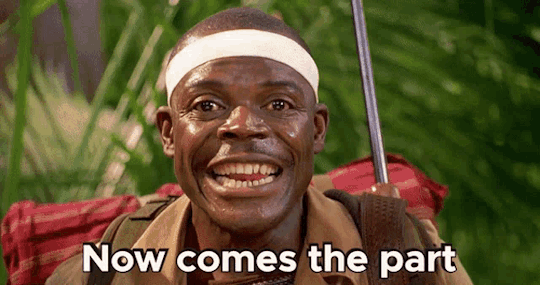
Situation 4
[Cliffhanger: it looks like Lyle has shot George from up close.]
Narrator: “Whew! Okay kids, let’s settle down and review the important information. Lyle is a big doofus. Poor George was actually shot but can’t die because, let’s face it, he’s the hero. So, the naturally concerned and preternaturally wealthy Ursula Stanhope whisked George away on a private jet bound for the country of his birth—”
[George has a tiny band-aid on his forehead.]
Narrator, cont’d: “—where he’s gonna get the finest medical treatment available!”
Ursula: “I’m gonna get you the finest medical treatment available.”
Situation 5
Narrator: “Well, Ursula […] could use a best friend now.”
Best friend: “Hi!”
Ursula: “He’s in the shower.”
Best friend, distracted: “Not anymore.”
George, naked: “Bad waterfall. First, water get hot—”
[A sexy saxophone plays]
George, cont’d: “Then George slips on this strange yellow rock.”
[Perspective: the camera looks at the two women, seen from between George’s legs. They are clearly ogling his crotch.]
[Ursula swoons.]
George, noticing the friend: “Hi! George of jungle.”
Friend, eager: “Charmed, I’m sure.”
[Ursula hands George objects that barely cover his crotch. The camera switches back to a frontal view of George. The friend is still ogling George.]
Best friend, mumbling appreciatively: “I see why they made him king of the jungle.”
***
I hope this was helpful. Don’t hesitate to ask me any questions, and happy writing!
Follow me for more writing advice, or check out my other writing tips here. New topics to write advice about are also always appreciated.
I'm too tired to bother with a tag list. If you like to be added to my list and get a notification whenever I post new writing advice, let me know.
#writing#sanne#creative writing#writing advice#writing tips#writing comedy#comedy#humor#humour#writing humor#writing humour#george of the jungle#how to tell me a story
130 notes
·
View notes
Text
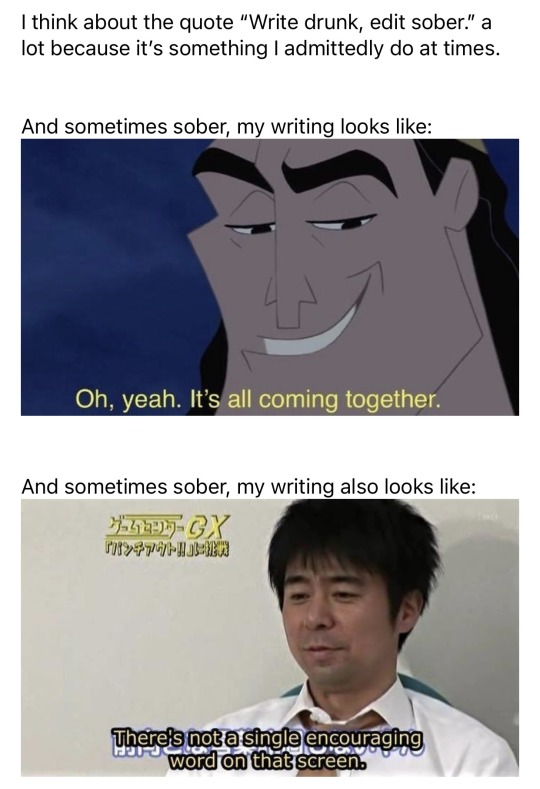
Enjoy this frazzled meme I made today while procrastinating 😵💫😅
Whether you’re writing drunk or high, remember to edit sober, my friends ✌🏻😌✨
#me with writing#writing#writers#writers on tumblr#writerblr#creative writing#writing tips#queer writers#queer author#queer authors#lgbtq writing#writing humor#writing memes#authors on tumblr#author life#author memes#author humor#lgbt writers#lgbt author#archive of our own#ao3#the locked door#the one she let in series#the one she let in series: the locked door
55 notes
·
View notes
Text
How To Write Humor
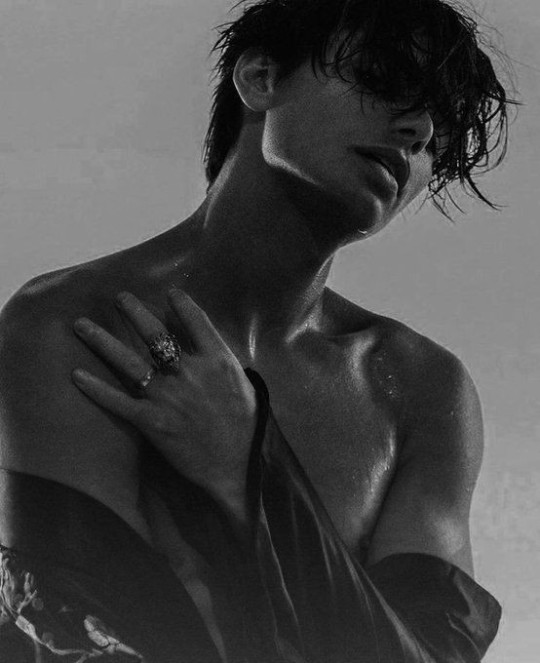

Making people laugh takes some skill and finesse, and, because so much relies on instinct, is harder to teach than other techniques. However, all writers can benefit from learning more about how humor functions in writing.
1. Identify Your Style Of Humor
Everyone has a different sense of humor. We all find different things funny for different reasons. This is why it’s important that before you sit down and try to write funny things, you think about your own personal sense of humor and how you want to mine that to produce a piece of humor writing.
1. Observational/situational humor: This involves finding humor in mundane, everyday situations.
2. Anecdotal humor: This involves mining personal stories for humor.
3. Dark (or gallows) humor: Finding humor in darker, more unpleasant circumstances or aspects of life, like death, suffering, and unhappiness.
4. Self-deprecating humor: This involves you, the writer, making fun of yourself for comedic effect. Having a sense of humor about yourself endears you to others.
5. Satirical humor: Looking to the various faults of individuals, organizations, or society and mining them for comedic purposes.
2. Use The Rule Of Three
The rule of three is a common rule in humor writing and one of the most common comedy writing secrets. It involves establishing a set pattern with two ideas and then subverting that pattern with a third, incompatible idea. For example:
“Can I get you anything? Coffee? Doughnut? A better attitude?”
3. Mine Humorous Anecdotes From Your Real Life
This is especially pertinent for humor essays. If you think about it, most of the funny things in your own life are things that our friends and family also find funny. These are the stories we tell over and over. These are the stories we use to bond or connect with others.
And personally I do this a lot.
4. Leverage Cliches
While clichés are something most writers try to avoid, it’s important to recognize them. Humor relies in part on twisting a cliché—transforming or undermining it. You do this by setting up an expectation based on the cliché and then providing a surprise outcome. For example: “What doesn’t kill you makes you stranger.” In humor writing, this process is called reforming.
Hope these help! Thank you and like, Share and Follow For more!
NEXT UP WILL BE QUICK TIPS ON HOW TO WRITE HUMOR, stay tuned!
#writing tips#writing advice#writing humor#how to write#books#readers of tumblr#writers#daily life#bookaddict#writers on tumblr#dank memes#reader problems#book blog#booklover#tumblr writers#writerslife
1K notes
·
View notes
Text
Enemies to lovers be like
Her pov: Uhg I hate him. I want to stab him to death. Why does everyone treat him so respectful? Like, he's just another hot guy why tf are you guys acting like he's a god or something.
His pov: I think I kinda like this girlie. (Just kidding, I fcking love her she's so cute)
#why is it always like this#like#the guy is in love from the start#writing#writer#enemies to lovers#enemies to lovers prompts#writing community#writeblr#writer life#writer memes#writer things#how to write#writers#writers block#writing humor#writing memes#writing tips#writers on tumblr#writerscommunity#writerslife#writers and poets
85 notes
·
View notes
Text
Violet Baudelaire knew what was up when she put her hair up to think. this is fr a life changing hack to actually getting writing done.
#writing#writing hacks#writing tips#writing memes#writing humor#asoue#a series of unfortunate events#violet baudelaire#the baudelaires
21 notes
·
View notes
Text
I had placed a stack of albums on the counter of a tiny strip mall record shop when my smartest writer friend called me out of the blue to tell me I should “always have a mistress.”
Relax. She meant a metaphorical mistress. That is, a writing project on the side. You have your main squeeze (a novel or a script) but then you flirt with the idea of writing a YA Romance or a Thriller or (god forbid) poetry. You need something to write that feels like a break from your “Big Project.”
I was staring at the cover of Tears for Fears’ Songs From The Big Chair, imagining the person I would be once I heard “Head Over Heels” on vinyl when my phone rang. I only had the ringer on because I was waiting for a potential call from a casting director. A certain late-night show sent out a casting notice for “shirtless man” and I, without any shame, turned on the lights in my wife’s office and had her take a few shots with my phone. I had the ringer on in case a stranger got my (half) nudes in an email, and said “That’s it! Get me that torso!” I’m sorry to say, enough time has passed without a call that you will not be seeing my chest on TV any time soon. Usually, my phone remains on silent when I’m out in the world. It also remains on silent when I’m at home because I’m staring at it all day anyway. Who needs to bring noise into that equation? If you call, I’ll see it.
Between the tone of her voice and the occasional swoosh of a car going by, I could tell my friend was driving and had me on speakerphone. She was on her way to lunch with someone on the business/agency side of Entertainment, heading to a mix of pleasurable banter over food with a friend but also a business-minded networking session with someone she hadn’t seen in 6 months. This call, pleasurable to me but in retrospect a bit of business since we talked instantly and almost entirely about work for 20 minutes, was eerily fortuitous. It was like she knew I was writing this week about work and relationships.
“You have the mistress project because it makes you feel young,” she said, telling me about her decision to write 50 pages of a Romance novel. “The problem is that you think ‘Maybe I should leave my wife for this younger project.’” She had submitted the first chunk of her frivolous manuscript to an agent, and, to her horror, the agent loved it. Now she has to live with it for a while. She has to explain to her previous project that they are either in a polyamorous marriage now or about to enter a trial separation. Plus, she had to see if the mistress project was wife material or if she’d fall into the same patterns as her previous relationship. OK. We get the metaphor.
“I’m afraid my new mistress is buying dollar records,” I said, watching the traffic go by, sipping from a lid-off paper cup full of Dunkin’ Donuts coffee that, between the time I’d spent looking at records and chatting in the parking lot, had turned cold. I felt the urge to rush back into the store and apologize to Timmy the manager for stepping out. I worried he’d already re-shelved my copy of The Go-Go’s Beauty And The Beat or that someone had seen the Tears For Fears on the top of “my” unpurchased heap and bought it for himself. This shopping trip was supposed to be an Artist Date (I guess the metaphor is still going), a weekly outing you do solo to engage with your Muse before journalling about it because a book called The Artist’s Way says it’s the only way to remain creative. You woo the Muse by engaging with art alone. Typically, I’d go to a museum or a movie by myself for my Artist Date but I’d had a record player for over 2 months and had only amassed a measly hundred-plus albums in my house so far. My next Artist Date will be a trip to IKEA to buy a shelf to hold more.
“No, Dan.” My brilliant friend said, “Replacing your main project with records or books is like saying you’re not going to have a mistress and instead get into sex dolls. You need a creative project.”
Read the rest of the essay here.
#essay#writing#amwriting#essays#substack#funny#tips#humor#personal essay#muse#art#better book titles#dan wilbur
29 notes
·
View notes
Text
Can I just skip to the part where my stories already have a fandom and I can just look up fan content? Like I just want to see gif sets and mood boards of my characters without having to actually write the story or being the one to make them, is that so hard to ask??
#writer things#writerscommunity#writerslife#writers and poets#writeblr#writing#writersofinstagram#writers on tumblr#writing tips#writers block#writers blog#writer humor#writer memes#writerblr#fandom#mentally exhausted#writing is a process#writing is my passion#fantasy writing#fantasy writer
203 notes
·
View notes
Text
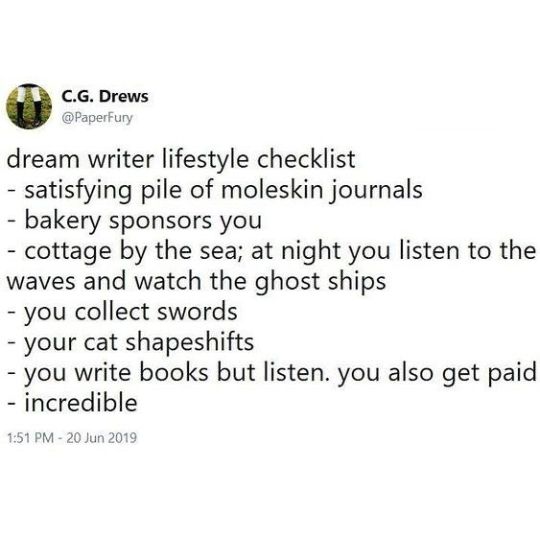
#writing#writers#writers on tumblr#writing community#writerscommunity#writer things#novel writing#writerslife#writers and readers#writing tips#writer memes#writing humor#writer problems#writer stuff#writing memes#writing problems
1K notes
·
View notes
Text
Prompts for writer block but it gets aggressively stupid
masterlist * ao3
-What do you think you are doing?
-erm.. i can explain. Maybe.. No.
-How did you even know that I like orange pie?
-I spied on you
-Wha ..
-Kidding I know someone that knows someone that knows someone…
-Wait. Did you just bite me?
-What's the difference between..
-Don't want to hear it
-.…
-Fine. Tell me your stupid joke already..
-It's called a surprise for a reason..
-why are you here for again?..
-I hit my head in the door.
-I think I am becoming more stupid.
-Tell me you didn't fall from the spinning chair again..
..
I'll take that silence as a yes..
-Why would you think that dieing the wall orange is a good idea?
-You are absolutely not driving us home.
-You have five seconds to explain why I didn't find you beside me when I woke up.
-Can you kindly get out and never come back?
-I forgot to do the project, can you add me? I'll give you my stickers!
-The mirror doesn't care, baby
-Sing me something..
-Au clair de la..
-Shut up.
-When I asked you to cut my bangs, I didn't mean you should make me look like Dora..
-I failed.. Kind of.. At least I had a good hair day.
-My ultimest fear is becoming one of those Auntie what's up addict that laugh at Minion memes
-They say it's not mainly to cry.. but holy I am holding my first born and the two of us are bawling.
-Can i please draw [..] on your face with sharpie?
-The pigeon pooped on me.
-It's his thank you.
-I hate squats.
-It hates you too.
-You're too good to feel such pain.
-Sit. Yo. Pretty. Butt. Down. We got a story to write.
-Are you still here? I thought you left.. Okay.. thanks for witnessing me being a crack head.
#𓆩♡𓆪 faith writes#writer humor#writers on tumblr#writing tips#writeblr#writblr#writing#writing prompt#writing challenge#writers and poets#stupid prompts#fic prompt#week#dialogue prompt#writing community#poets on tumblr#writerscommunity
18 notes
·
View notes
Text
.
#i have been lazily tip-tapping away at my google doc whilst sunning myself by the pool this week#and although that has not resulted in much actual ‘writing’#my outline grows ever more robust#but more importantly i think the fic has grown a theme#which delights me#my most satisfying fics to write and the most well received have been the ones with a central theme that was meaningful to me#like how good times was about internalized biphobia and forever too much was about humor as a defense mechanism#did not expect the one that has emerged here but i think it will make for a more interesting rutger characterization#now if i could actually sit down and write instead of accidentally adding notes for another goddamn sex scene every time i open this doc#we’d really be in business#lafiwrimo
8 notes
·
View notes
Text
me, a certified mess, reading a post with tips on how to be a productive writer:

#like brain does not compute how to apply these in real life#IM TOO TIRED TO BE ORGANIZED#writing#writer#writers#writeblr#writing problems#writer problems#writing meme#writer meme#writeblr meme#writer humor#writing humor#writers of tumblr#writing tips#just writer problems#just writer things#fanfic writer#fanfiction writer#writing positivity
97 notes
·
View notes